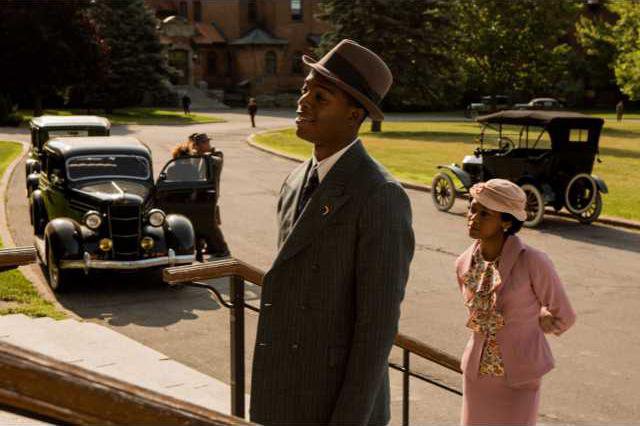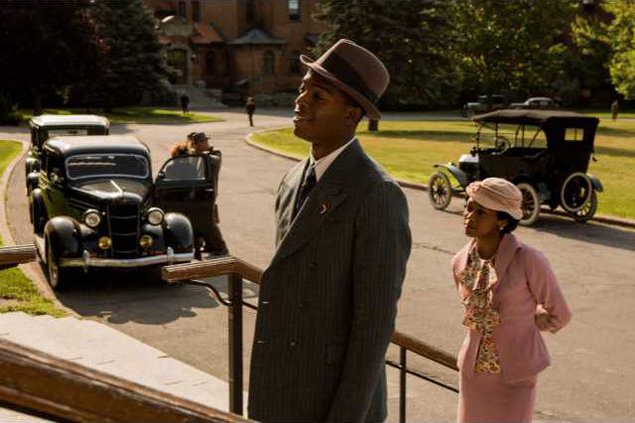"RACE" 3 stars Stephan James, Jason Sudeikis, Eli Goree, Shanies Banton, Jeremy Irons; PG-13 (thematic elements and language); in general release
"Race" is a collection of good parts that make up a decent whole. Based on the true story of Jesse Owens, the African-American track star who won four Olympic gold medals at the 1936 games in Berlin, Race covers a lot of ground and delivers some memorable moments, but struggles under the weight of its scope.
"Race" opens in 1933 as Owens (Stephan James) leaves his home in Depression-era Cleveland to attend college at Ohio State University. There he meets coach Larry Snyder (Jason Sudeikis), a former runner struggling with the pressure of running a top-flight track program.
It isn't long before Owens begins to generate publicity with his feats on the field, and the focus is soon trained on the Olympic Games. But no matter how good Owens may be, the threat of an American boycott of the Nazi-hosted event could render his performance irrelevant.
Owens also has issues closer to home. 1930s Columbus is no warm welcome for black athletes, no matter how talented they are, and the prejudice even permeates the OSU locker room. And back home, Owens has a fiance (Shanice Banton) and young child to support, which gets tricky when you factor in the temptations that arrive with fame and fortune.
While Owens wrestles with his personal challenges, Avery Brundage (Jeremy Irons) is cast as the Olympic liaison between the American government and the Nazis. As he negotiates behind the scenes, he encounters Joseph Goebbels (Barnaby Metschurat) and Leni Riefenstahl (Carise van Houten), the filmmaker tasked with immortalizing Hitler's showcase games.
A lighter touch might have helped these scenes, as the action comes to a halt in an almost melodramatic manner whenever Goebbels appears on screen. (Hitler himself is only seen in fleeting glimpses.) But the American moral dilemma is clear: Is it better to participate and set politics aside, or stand up for the human rights the Nazis trampled? Owens shares the same dilemma, only complicated by the racial tensions of his own country.
The most compelling element of "Race" is how it brings together narratives that have been heavily explored in other films. The issue of racism in America has been mined extensively, as has the Holocaust of Nazi Germany. By bringing both issues together in a single historical film, "Race" stands apart from its peers, but it also struggles under its own weight.
And that's why it might be easier to look at "Race" as a member of a third genre a sports movie. In fact, the athletes in "Race" even refer to the idea of sports standing apart from politics and the pressures of culture, or at least intending to. When he is out on the track running, Owens says, he truly feels free.
James is convincing as Owens, if a little two-dimensional, and "Race's" actual sports action is comparatively minimal. But given Owens' historic success at the games, "Race" is less about suspense and more about appreciating the path he took to get there. Its storytelling might be labored, but its still a story worth seeing.
"Race" is rated PG-13 for thematic elements and language; running time: 134 minutes.
"Race" is a collection of good parts that make up a decent whole. Based on the true story of Jesse Owens, the African-American track star who won four Olympic gold medals at the 1936 games in Berlin, Race covers a lot of ground and delivers some memorable moments, but struggles under the weight of its scope.
"Race" opens in 1933 as Owens (Stephan James) leaves his home in Depression-era Cleveland to attend college at Ohio State University. There he meets coach Larry Snyder (Jason Sudeikis), a former runner struggling with the pressure of running a top-flight track program.
It isn't long before Owens begins to generate publicity with his feats on the field, and the focus is soon trained on the Olympic Games. But no matter how good Owens may be, the threat of an American boycott of the Nazi-hosted event could render his performance irrelevant.
Owens also has issues closer to home. 1930s Columbus is no warm welcome for black athletes, no matter how talented they are, and the prejudice even permeates the OSU locker room. And back home, Owens has a fiance (Shanice Banton) and young child to support, which gets tricky when you factor in the temptations that arrive with fame and fortune.
While Owens wrestles with his personal challenges, Avery Brundage (Jeremy Irons) is cast as the Olympic liaison between the American government and the Nazis. As he negotiates behind the scenes, he encounters Joseph Goebbels (Barnaby Metschurat) and Leni Riefenstahl (Carise van Houten), the filmmaker tasked with immortalizing Hitler's showcase games.
A lighter touch might have helped these scenes, as the action comes to a halt in an almost melodramatic manner whenever Goebbels appears on screen. (Hitler himself is only seen in fleeting glimpses.) But the American moral dilemma is clear: Is it better to participate and set politics aside, or stand up for the human rights the Nazis trampled? Owens shares the same dilemma, only complicated by the racial tensions of his own country.
The most compelling element of "Race" is how it brings together narratives that have been heavily explored in other films. The issue of racism in America has been mined extensively, as has the Holocaust of Nazi Germany. By bringing both issues together in a single historical film, "Race" stands apart from its peers, but it also struggles under its own weight.
And that's why it might be easier to look at "Race" as a member of a third genre a sports movie. In fact, the athletes in "Race" even refer to the idea of sports standing apart from politics and the pressures of culture, or at least intending to. When he is out on the track running, Owens says, he truly feels free.
James is convincing as Owens, if a little two-dimensional, and "Race's" actual sports action is comparatively minimal. But given Owens' historic success at the games, "Race" is less about suspense and more about appreciating the path he took to get there. Its storytelling might be labored, but its still a story worth seeing.
"Race" is rated PG-13 for thematic elements and language; running time: 134 minutes.





